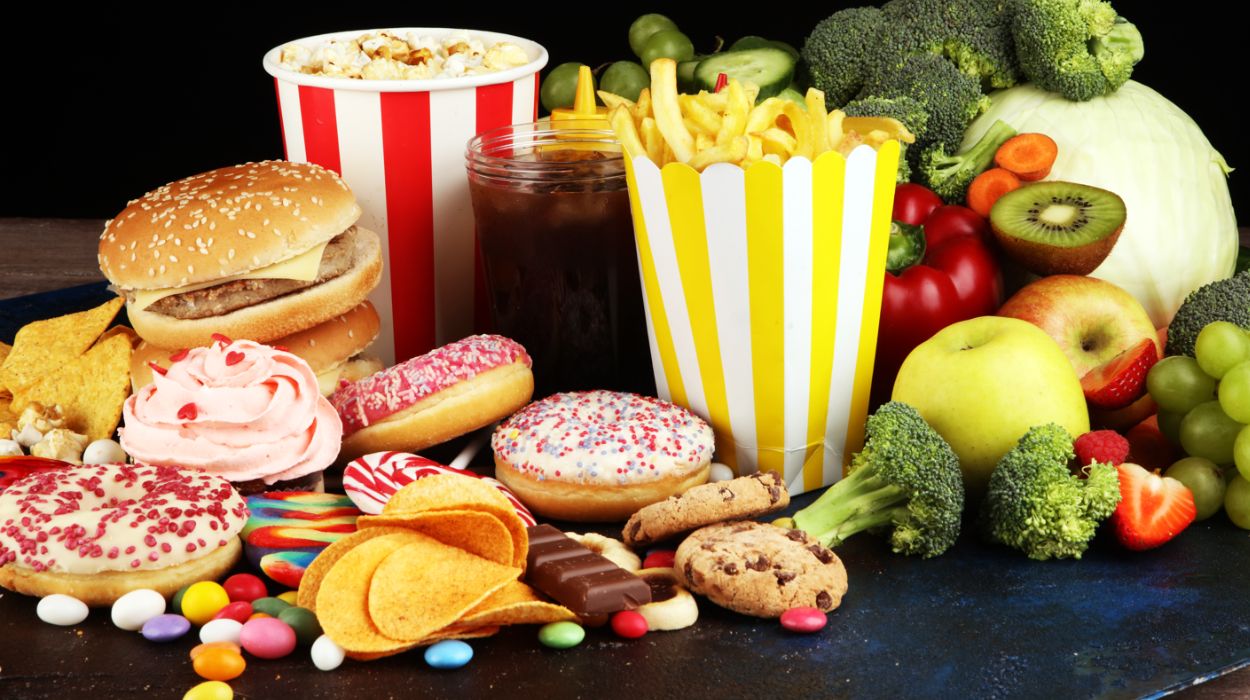 Expert's opinion
Expert's opinion
Expert's opinion
The article is a subjective view on this topic written by writers specializing in medical writing.
It may reflect on a personal journey surrounding struggles with an illness or medical condition, involve product comparisons, diet considerations, or other health-related opinions.
Although the view is entirely that of the writer, it is based on academic experiences and scientific research they have conducted; it is fact-checked by a team of degreed medical experts, and validated by sources attached to the article.
The numbers in parenthesis (1,2,3) will take you to clickable links to related scientific papers.
How To Lose Weight While Breastfeeding: 7 Safe & Healthy Ways 2024

How To Lose Weight While Breastfeeding? – While losing weight should be the last thing that any breastfeeding mom should have to think about, there may be a time when you need to drop some of that pregnancy weight after giving birth to feel better about yourself or for health reasons.
Many women can lose their baby weight quickly, while for others it can be a slow and steady struggle. Despite the challenge, La Leche advises that breastfeeding moms can lose weight safely, around one pound a week.
There are safe ways to reduce your weight while breastfeeding, but since everyone is different, it may take some experimenting and patience to find out what works best for you.
If you want to know how to lose weight while breastfeeding, this article will go over seven safe ways to optimize your lifestyle to help you lose weight as soon as possible and maintain a steady breast milk supply.
7 Safe & Healthy Ways To Lose Weight While Breastfeeding
- Hydration
- Eat superfoods
- Eliminate unhealthy foods and drinks
- Increase foods that promote weight loss
- Sleep
- Moderate exercise
- Meal plan
Losing Weight While Breastfeeding Without Losing Milk Supply
After giving birth, each individual returns to a healthy weight at a different rate. Breastfeeding typically increases your appetite and thirst since breastfeeding burns calories, and your body is busy making nutrient-rich food for your baby.
If you’re planning to start losing weight while breastfeeding, there are certain things you can do to help increase your chances of weight loss and maintain a healthy breast milk supply.
Hydration
Breast milk is about 87% water[1]. So it’s no surprise that a breastfeeding mom may need at least 16 cups per day or 128 ounces. So yes, this means always keeping water with you. Consider it your new best friend. Hydration is more than just part of lactation and makes your entire body’s functioning work.
Staying hydrated and increasing your water intake[2] can increase your energy levels, metabolism, and fat-burning potential, which can lead to postpartum weight loss. Hydration helps you stay fuller, flushes out extra water weight, and prevents overeating. On the other hand, dehydration, or not getting enough water, can lead to weight gain and promotes obesity[3].
Aiming to drink a cup of water every hour and every time you nurse can help keep you on track. Finding a cup or decorative glass to drink out of, that brings you joy to look at, will make drinking frequently more enjoyable.
Eat Superfoods
Superfoods are nutrient-rich foods with vitamins and minerals full of health benefits when eaten with a healthy diet. These can promote weight loss and help maintain a healthy milk supply.
A diet high in nutrients[4] is beneficial for postpartum weight loss, reducing hunger, and long-term health. Some superfoods to consider adding to your food regimen are:
- Turmeric
- Berries
- Leafy green vegetables like spinach and kale
- Nuts and seeds
- Avocado
- Cinnamon
Eliminate Unhealthy Foods And Drinks

While many unhealthy junk foods have more calories to help you meet your calorie count, you want to eat the right type of calories. Sugary snacks or ultra-processed foods high in saturated fats[5], like fried chicken or pizza, can cause you to gain more weight. Also, they often significantly increase sodium intake, which can cause you to hold on to extra water weight instead of using the water to support your milk supply.
It can help your weight loss goals by avoiding low-nutrient foods and beverages that are essentially empty calories, like cheese, cakes, white bread, and soda. Find a replacement for these to eat that you can learn to like so you and your baby can receive the benefits of healthier foods, like replacing your refined pasta with chickpea pasta that is high in protein. You may be pleasantly surprised at how you feel after eliminating unhealthy foods.
Lower the amount of simple carbohydrates you take in, like potato chips, white pasta, and cookies. Carbohydrates[6] can increase your appetite instead of satisfying it, and fuel hunger for sugary foods that can cause you to gain extra weight.
Foods that are unhealthy for you may also present like foods that you are allergic to or intolerant to. Pregnancy can change a woman’s body dramatically and sometimes results in a change in her taste and tolerance of foods. For example, weight loss could be as simple as taking the time for an elimination diet of the top food allergens, e.g., eggs, dairy, soy, and gluten, to find out what your body doesn’t respond well to, which could result in inadequate weight loss.
Increase Foods That Promote Weight Loss
A healthy diet full of protein, fiber, and healthy fats (like monounsaturated and omega-3 fatty acids) can encourage weight loss. These help you to stay full and reduce cravings for unhealthy foods.
- Studies show that fiber is an essential key to weight loss intervention. Whole food sources of fiber include sweet potatoes and whole grains like oats, quinoa, and brown rice.
- Replacing unhealthy fats[7], like saturated fat, with healthy fats may increase your chances of weight loss. Some good sources of healthy fats to eat include olive oil, avocados, and fatty fish like salmon and tuna.
- Diets high in lean protein can help to reduce body weight and fat mass. You can choose healthy protein sources like chicken, beans, nuts, and protein powders for breastfeeding.
Sleep
Getting enough sleep for breastfeeding moms might seem impossible at stages, but sleep is another essential ingredient to weight loss. Sleep is when your body heals and restores from the long day.
The disruption of sleep patterns[8] that come with nighttime baby wakings and feedings can lead to an increased appetite for extra calories, especially for carbs and fatty foods, and can negatively impact weight loss interventions. Several studies link a lack of sleep to obesity, so it’s worth optimizing your sleep quality (“sleep hygiene”) as much as you’re able.
Moderate Exercise
When you’ve reached the point of getting back into physical activity, moderate exercise[9] combined with a healthy diet and lifestyle can provide you with more energy, increase your metabolism, build muscle mass, and help reduce weight.
Physical activity has evidence behind it that it helps in reducing weight, depression[10], and cognitive function, as well as helps with sleep regulation. You can start at 10-15 minutes per day and add 5 minutes daily as your strength increases with exercises like
- Natural exercises that include holding the baby, like squatting, knee lifts, and lunges
- Brisk stroller walks
- Strength training
- Swimming
- Aerobics and dance exercises
You may want to look into an exercise program specifically for postpartum moms since specific exercises, like crunches and sit-ups, can delay or reverse your body’s healing after giving birth. Exercises that keep postpartum bodies in mind are especially important after C-sections and for those with diastasis recti, where the abdominal muscles separate.
Meal Plan

If you want to lose weight while breastfeeding, a meal plan can certainly help. Planning your meals ahead of time will help you avoid skipping meals which can lead you to pick unhealthy, processed, high-calorie foods and eat too many calories.
Planning to eat at least three meals a day with snacks in between can help your metabolism to keep up and give your body the fuel it needs for energy and making the baby’s milk.
A few things you can plan and prep ahead of time for a well-balanced diet are
- Sliced fruits and veggies
- Lactation energy bites
- Freezer meals
- Smoothie packs
- Batches of brown rice
- Salad mix
- Overnight oats
Why Is It Hard To Lose Weight While Breastfeeding?
After your baby is born, you’ll experience an initial and significant weight loss that is attributed to the baby’s body, placenta, and fluids. Then it’s common to hear complaints from breastfeeding mothers in their fourth trimester, or postpartum phase, discussing their inability to drop those last few pounds. There could be several reasons for struggling with losing weight while breastfeeding.
Not Eating The Right Amount
If you skip meals, it can make you feel tired and sluggish while slowing down the metabolism you need for weight loss. On the other hand, overeating will add additional calories that might prevent weight loss or result in weight gain. Postpartum is a great time to get to know your body and what it needs so you can eat the right amounts of the right foods.
It’s more complicated than just handing you several how many calories you need to lose weight while breastfeeding–not to mention this can be unhealthy. Your calorie intake depends on many factors, including how old your baby is, how often they are nursing and your body mass index. Speaking with a registered dietitian to figure out the total calories you need and formulate a customized plan may help you succeed faster than if you go through this complicated weight loss journey alone.
Stress
When your body is under stress, it can raise your cortisol levels. When cortisol levels[11] are chronically high, it can result in weight gain, especially around the midsection. So if you’re wondering how to lose belly fat while breastfeeding, lowering your stress levels may benefit you.
Making sure to take time each day to handle your stress in ways that benefit you best is one way to help lower stress levels. Examples of relieving stress healthily can be a daily Epsom salt bath, journaling, or strolling the baby while enjoying nature. Taking time in your day for gratitude is also beneficial for stress and depression levels[12].
Lack Of Sleep
As mentioned earlier, getting as much sleep as you can is important to maintain a healthy weight. If you can, sleeping when your baby sleeps is one way to help achieve adequate rest time.
If you’re struggling with insomnia and can’t sleep at night, avoiding junk food, getting enough physical activity, and lowering your stress levels can help you rest easier. Since sleep is so important, it may benefit you to talk to your health provider about safe vitamins and/or mineral supplements that can help you avoid restless nights.
Hormones
To further complicate losing weight postpartum, your body’s hormones don’t just control how you feel mood-wise after pregnancy. The hormone prolactin[13] does many things, like regulate how much milk you’re making, help you store body fat while breastfeeding to protect your body’s ability to produce milk, and increase your appetite. The actions of this one hormone alone can result in trouble losing weight while breastfeeding.
The Bottom Line
Postpartum weight loss can be challenging, but you can take it one step at a time. Mindful and healthy eating and drinking, consuming superfoods, and eliminating unhealthy foods may be the fastest ways to lose weight while breastfeeding.
Safely losing weight will help protect your milk production and provide essential nutrients. Adding in exercise, a healthy amount of sleep, and planning out your meals can also help set you up for success in losing weight.
If you are determined to lose weight, you may want to contact your lactation consultant or healthcare provider before you try dieting while breastfeeding; such a review can assess your hormones and overall health since lowering your daily calorie intake and rapid weight loss could reduce a good milk supply.
+ 13 sources
Health Canal avoids using tertiary references. We have strict sourcing guidelines and rely on peer-reviewed studies, academic researches from medical associations and institutions. To ensure the accuracy of articles in Health Canal, you can read more about the editorial process here
- Martin, C., Ling, P.-R. and Blackburn, G. (2016). Review of Infant Feeding: Key Features of Breast Milk and Infant Formula. Nutrients, [online] 8(5), p.279. doi:10.3390/nu8050279.
- Thornton, S.N. (2016). Increased Hydration Can Be Associated with Weight Loss. Frontiers in Nutrition, [online] 3. doi:10.3389/fnut.2016.00018.
- Chang, T., Ravi, N., Plegue, M.A., Sonneville, K.R. and Davis, M.M. (2016). Inadequate Hydration, BMI, and Obesity Among US Adults: NHANES 2009-2012. The Annals of Family Medicine, [online] 14(4), pp.320–324. doi:10.1370/afm.1951.
- Fuhrman, J., Sarter, B., Glaser, D. and Acocella, S. (2010). Changing perceptions of hunger on a high nutrient density diet. Nutrition Journal, [online] 9(1). doi:10.1186/1475-2891-9-51.
- Hariri, N., Gougeon, R. and Thibault, L. (2010). A highly saturated fat-rich diet is more obesogenic than diets with lower saturated fat content. Nutrition Research, [online] 30(9), pp.632–643. doi:10.1016/j.nutres.2010.09.003.
- Geiselman, P.J. and Novin, D. (1982). The Role of Carbohydrates in Appetite, Hunger and Obesity. Appetite, [online] 3(3), pp.203–223. doi:10.1016/s0195-6663(82)80017-2.
- Piers, L.S., Walker, K.Z., Stoney, R.M., Soares, M.J. and O’Dea, K. (2003). Substitution of saturated with monounsaturated fat in a 4-week diet affects body weight and composition of overweight and obese men. British Journal of Nutrition, [online] 90(3), pp.717–727. doi:10.1079/bjn2003948.
- Papatriantafyllou, E., Efthymiou, D., Zoumbaneas, E., Popescu, C.A. and Vassilopoulou, E. (2022). Sleep Deprivation: Effects on Weight Loss and Weight Loss Maintenance. Nutrients, [online] 14(8), p.1549. doi:10.3390/nu14081549.
- Cox, C.E. (2017). Role of Physical Activity for Weight Loss and Weight Maintenance. Diabetes Spectrum, [online] 30(3), pp.157–160. doi:10.2337/ds17-0013.
- Kołomańska-Bogucka, D. and Mazur-Bialy, A.I. (2019). Physical Activity and the Occurrence of Postnatal Depression—A Systematic Review. Medicina, [online] 55(9), p.560. doi:10.3390/medicina55090560.
- Hewagalamulage, S.D., Lee, T.K., Clarke, I.J. and Henry, B.A. (2016). Stress, cortisol, and obesity: a role for cortisol responsiveness in identifying individuals prone to obesity. Domestic Animal Endocrinology, [online] 56, pp.S112–S120. doi:10.1016/j.domaniend.2016.03.004.
- Komase, Y., Watanabe, K., Hori, D., Nozawa, K., Hidaka, Y., Iida, M., Imamura, K. and Kawakami, N. (2021). Effects of gratitude intervention on mental health and well‐being among workers: A systematic review. Journal of Occupational Health, [online] 63(1). doi:10.1002/1348-9585.12290.
- Kirsch, P., Kunadia, J., Shah, S. and Agrawal, N. (2022). Metabolic effects of prolactin and the role of dopamine agonists: A review. Frontiers in Endocrinology, [online] 13. doi:10.3389/fendo.2022.1002320.



